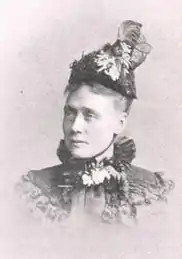Julia M. Crottie | |
|---|---|
 Julia M. Crottie, from a 1901 publication. | |
| Born | 1853 Lismore, County Waterford |
| Died | c.1930 |
| Occupation | Writer |
| Nationality | Irish |
Julia M. Crottie (1853 – about 1930), sometimes seen as Julia Crotty, was an Irish novelist who detailed rural life in Ireland, writing during the late 19th and early 20th centuries.
Early life
Crottie was born in 1853 in Lismore, County Waterford. She was educated at the Presentation Convent school in Waterford, before emigrating to America.[1][2][3]
Career
Writing
Crottie wrote short stories[4][5] and novels,[6] and contributed to periodicals, including Catholic World.[7] Her stories about Ireland featured satirical portrayals of the people who emigrated from Ireland, returned or never got to emigrate. Her work portrayed some of the less pleasant features of small town rural Ireland.[8] Many of her stories were set in fictional Innesdoyle, substantially based on Lismore,[9] of which she wrote, "Nobody who has not lived in a stagnant town like Innisdoyle can know to what blackness of malice... suspicion may lead".[2]
Reception
Crottie was compared by the Glasgow Herald to Edgeworth and Carleton.[10] She was a correspondent of Katharine Tynan and of Edmund Downey, among other Irish literary figures.[11] "I have heard it said that Miss Crottie shows us too much of what is unlovely and pitiful, and mean", commented critic Justin McCarthy in 1901, "but the complaint seems to me to be about as unreasonable as it would be to find fault with Charles Dickens" for similar unlikeable characters.[12] Crottie's first novel, Neighbors, was presented to King Edward VII when he stayed at Lismore Castle in 1904.[13]
Personal life
She moved from the United States to the Isle of Man for a time. She died about 1930, in her seventies.[2]
Selected works
References
- ↑ "Julia M. Crottie". The Concise Oxford Companion to Irish Literature. Retrieved 29 March 2020.
- 1 2 3 Marchbanks, Paul (2006). "Julia M. Crottie". In Gonzalez, Alexander G. (ed.). Irish Women Writers: An A-to-Z Guide. Greenwood Publishing Group. pp. 72–75. ISBN 978-0-313-32883-1.
- ↑ McCarthy, Justin; Egan, Maurice Francis; Hyde, Douglas; Welsh, Charles; Gregory, Lady; Roche, James Jeffrey (1904). Irish Literature. J. D. Morris. p. 758.
- ↑ Crottie, Julia M. (4 November 1899). "Mr. O'Reilly's Outing". The Nottinghamshire Guardian. p. 6. Retrieved 29 March 2020 – via Newspapers.com.
- ↑ Crottie, Julia M. (19 January 1902). "The House that Bertha Built". The Philadelphia Times. p. 20. Retrieved 29 March 2020 – via Newspapers.com.
- ↑ Stephen Brown, ed. (1919). Ireland in Fiction. Maunsel.
- ↑ Crottie, Julia M. "The Glenribbon Baby" Catholic World 40(2)(December 1884): 417-425.
- ↑ "Review of Neighbours by Julia M. Crottie". The Athenaeum (3802): 309. 8 September 1900.
- ↑ Power, Patrick (1907). The Place-names of Decies. D. Nutt. p. 14.
- ↑ "Waterford Novelists & Playwrights". Munster Literature Centre. Retrieved 29 March 2020.
- ↑ Catherine Fahey, Collection List for the Edmund Downey Papers, National Library of Ireland.
- ↑ Justin McCarthy, "A New Irish Novelist" The Bookman (April 1901): 12.
- ↑ "Untitled brief item". The Publisher's Circular. 28 May 1904.
- ↑ Crottie, Julia M. "The Nest in Kilcrona", a novel serialized in The Current, from 23 February 1884 to 12 April 1884.
- ↑ Crottie, Julia M (1900). Neighbors. London: T. Fisher Unwin Paternoster Square. OCLC 993669777.
- ↑ Crottie, Julia M (1901). The lost land; a tale of a Cromwellian-Irish town, being the autobiography of Miss Anita Lombard, 1780-1797. London: T.F. Unwin. OCLC 19622230.
- ↑ Crottie, Julia M (1920). Innisdoyle neighbors. Manchester, N.H.: Magnifcat Press. OCLC 35810640.